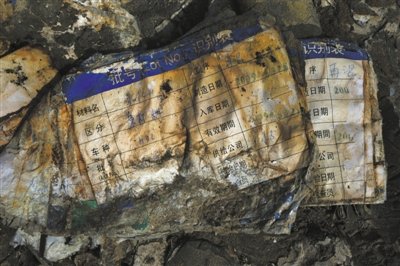Korean company in toxic waste scandal
- By Chen Xia
 0 Comment(s)
0 Comment(s) Print
Print E-mail China.org.cn, April 2, 2013
E-mail China.org.cn, April 2, 2013
In Dec. 2011, Miyun environmental protection authorities took a soil sample for testing from Liu's land. In Feb. 2012, authorities issued a letter confirming that KB had violated environmental rules but didn't mention whether Liu's land was polluted. Meanwhile, an agricultural expert told Liu in private that her land could no longer be used for agricultural purposes.
 |
|
A piece of paper with "Date of Production: 2009" on it, is found within the toxic waste. |
In April 2012, Liu sued KB and asked for the compensation of one million yuan. However, the first trial didn't end in her favor because she couldn't prove that no agricultural products could be grown on her land and the trees had been killed by the toxic waste.
During the second trial in March 2013, KB's lawyer admitted the dusts on Liu's land came from KB. It turned out that KB hired a garbage disposal company to deal with the waste, but the company later gave that job to a local man.
Since 2008, the man had been dumping KB's waste on Liu's land once a week until Liu discovered it in 2011. Afterwards, the man dumped the waste on the land belonging to the village nearby, because, as the man put it, no one would care about a collective property.
According to Chinese laws, when dealing with material listed in the national hazardous waste category, specialized vehicles should be used and a professional organization should be in charge.
According to Miyun land resource department, further investigations should be done to determine if Liu's land has been polluted, and it will take some time to find out the amount of waste dumped there. The long-term impact on the environment is thus unable to be determined.
The woods are only three kilometers away from a section of the canal of the South-to-North Water Diversion Project, a grand design to transfer water from the water-rich south of the country to its arid northern parts.
The good news is that local government has promised to tighten surveillance in the future.






Go to Forum >>0 Comment(s)